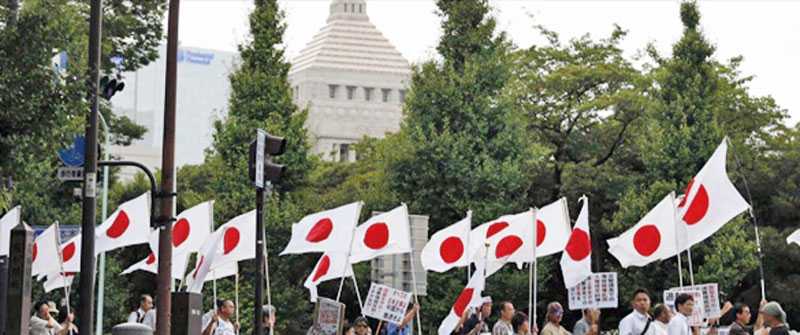Sunday Feb 22, 2026
Sunday Feb 22, 2026
Thursday, 4 February 2021 00:00 - - {{hitsCtrl.values.hits}}

Japan and South Korea both returned to the “full democracy” fold for the first time since 2014. Taiwan attained “full democracy” status for the first time following a spectacular jump up the rankings
‘Democracy in sickness and in health?’ is the title of The Economist Intelligence Unit’s latest Democracy Index report, which looks at the impact of the coronavirus (Covid-19) pandemic on freedom and democracy around the world. The Asia and Australasia region includes top-scoring New Zealand (9.25), which retained its 4th position in the global ranking (out of 167 countries), and persistent laggard North Korea (1.08) at the bottom of the global ranking in 167th place.
The region’s overall score fell in 2020, but it now has five “full democracies” with Japan, South Korea and Taiwan moving up the rankings compared with 2019. Australia retains its “full democracy” status and high ranking (9th).
Japan and South Korea both returned to the “full democracy” fold for the first time since 2014. Taiwan attained “full democracy” status for the first time following a spectacular jump up the rankings. The January 2020 national elections demonstrated the resilience of Taiwan’s democracy, at a time when electoral processes, parliamentary oversight and civil liberties have been backsliding globally.
For South Korea, a tiny improvement of 0.1 points was enough for the country to regain the status of “full democracy”. A deterioration in the country’s score for civil liberties was offset by an improvement in its score for functioning of government as public confidence in the government improved. Japan’s score improved from 7.99 in 2019 to 8.13 in 2020, putting it in 21st place globally.
The change was also driven by an improvement in public confidence in the government and survey data also show that fewer Japanese now prefer rule by technocrats to rule by elected representatives. There were other positive developments for democracy, too. Despite the Covid-19 pandemic, national elections took place peacefully in Mongolia, New Zealand, Singapore, South Korea and Sri Lanka, as well as in Taiwan.
Despite these upgrades, Asia’s average regional score deteriorated to its lowest level since 2013 as official measures taken to combat the coronavirus pandemic led to some of the most severe constraints on individual freedoms and civil liberties in the world. China, Singapore and others went much further than the rest of the world in tracking and policing their citizens and locking them down in response to the Covid-19 pandemic. As a result, more than half of the countries in the region recorded a fall in their total score.
However, the biggest country downgrades, for Myanmar and Hong Kong, were driven by other factors, including mass voter suppression in the former and a crackdown by the authorities on dissent in the latter. These factors led the two countries to fall down the global rankings by 13 and 12 positions, respectively, and Hong Kong lost its status as a “flawed democracy” and is now categorised as a “hybrid regime”.
In Southeast Asia, Thailand’s score regressed in 2020, including those related to the treatment of the opposition and to curbs on freedom of expression. In India, democratic backsliding continued under the leadership of Narendra Modi, a member of the Hindu-nationalist Bharatiya Janata Party (BJP), who has introduced a religious element to the conceptualisation of Indian citizenship, a step that many critics see as undermining the secular basis of the Indian state. The authorities’ handling of the coronavirus pandemic led to a further erosion of civil liberties in 2020.
Joan Hoey, Editor of The Economist Intelligence Unit’s annual Democracy Index report, says: “The symbolism of Asia gaining three new “full democracies” in 2020 and western Europe losing two (France and Portugal) was apt, as the coronavirus pandemic has accelerated the shift in the global balance of power from the West to the East. Asia continues to lag behind the West in democratic terms having only five “full democracies”, compared with western Europe’s 13, but the region has, so far, handled the pandemic much better than virtually any other, with lower infection and mortality rates and a fast economic rebound. Asian governments reacted decisively (albeit deploying coercive powers in some cases), benefited from well-organised health systems and retained the confidence of their populations. By contrast, European governments were slow to act, some health systems came close to collapse and public trust in government declined.”
The Economist Intelligence Unit’s Democracy Index is based on five categories: electoral process and pluralism; the functioning of government; political participation; political culture; and civil liberties. The index provides a snapshot of the current state of democracy worldwide for 165 independent states and two territories (almost the entire population of the world).
The overall index of democracy, on a 0 to 10 scale, is based on the ratings for 60 indicators grouped in the five categories. The overall index is the simple average of the five category indexes. A three-point scoring system for the 60 indicators is used. The category indexes are based on the sum of the indicator scores in the category, converted to a 0 to 10 scale. Based on their total score, countries are classified as one of four types of regime: “full democracy” (scores greater than 8); “flawed democracy”—scores greater than 6 and less than or equal to 8; “hybrid regime”—scores greater than 4 and less than or equal to 6; “authoritarian regime”—scores less than or equal to 4.
The Economist Intelligence Unit (The EIU) is the world’s leading resource for economic and business research, forecasting and analysis. It provides accurate and impartial intelligence for companies, government agencies, financial institutions and academic organisations around the globe, inspiring business leaders to act with confidence since 1946. The EIU products include its flagship Country Reports service, providing political and economic analysis for 199 countries, and a portfolio of subscription-based data and forecasting services. The company also undertakes bespoke research and analysis projects on individual markets and business sectors.